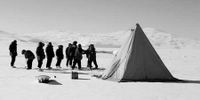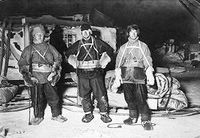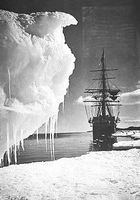Scott's Fatal Antarctic Expedition
 In 2003 PBS aired the haunting Tragedy at the Pole; it featured research by Susan Solomon, whose book The Coldest March: Scott's Fatal Antarctic Expedition re-examines data from the trip. I want to do a Cliff Notes version for you.
In 2003 PBS aired the haunting Tragedy at the Pole; it featured research by Susan Solomon, whose book The Coldest March: Scott's Fatal Antarctic Expedition re-examines data from the trip. I want to do a Cliff Notes version for you. The numerous near-fatal disasters on Scott's first trip to Antarctica didn't chasten him as he prepared for the second. 8,000 men volunteered to join him in the wildly popular trek which was supposed to "claim" the South Pole for England. (Here, a recent photo of his camp, which is still standing though in need of repair.)
The numerous near-fatal disasters on Scott's first trip to Antarctica didn't chasten him as he prepared for the second. 8,000 men volunteered to join him in the wildly popular trek which was supposed to "claim" the South Pole for England. (Here, a recent photo of his camp, which is still standing though in need of repair.)| Over the years, Scott has been portrayed as a bumbling captain whose poor leadership and inadequate preparation doomed his expedition and companions. Though she is sympathetic to his bad luck, Solomon writes: "He certainly made some mistakes." Scott himself wrote "I may as well confess at once that I had no predilection for Polar exploration." |
 The trip was disastrously delayed. Fearing the ponies would freeze, Scott delayed his start till November. Then, after a gale washed 10 tons of coal overboard and hurt the animals ("the dogs, made fast on deck, were washed to and fro, chained by the neck, and often submerged for a considerable time..."), the ship was frozen in the ice for three weeks during which supplies were consumed and winter was approaching.
The trip was disastrously delayed. Fearing the ponies would freeze, Scott delayed his start till November. Then, after a gale washed 10 tons of coal overboard and hurt the animals ("the dogs, made fast on deck, were washed to and fro, chained by the neck, and often submerged for a considerable time..."), the ship was frozen in the ice for three weeks during which supplies were consumed and winter was approaching. Dismal mistakes (in hindsight):
Dismal mistakes (in hindsight):- An inexperienced agent chose the Manchurian ponies and they were inferior. Scott's only specification had been that they be white! Dogs would have been better but Scott didn't trust them after his earlier voyage (even though their troubles then had been caused by rotten and inadequate food).
- The horse snowshoes were left behind. "It is pathetic to see the ponies floundering." They were soon useless and all that hadn't died of starvation or misadventure were killed and eaten.
- The motor sledges were a flop. One sank through the ice to the bottom of the bay on its first day. The other two just stopped working in the cold.
- They lost all their navigational books and devices one by one. It was hard, even with the equipment, to negotiate the icy, monotonous desert. The sun doesn't rise or set properly or in the proper places. Compasses just want to point downward.
- A shortage of fuel caused by leaky oil cans could have been avoided had Scott, like Amundsen, reinforced the cans with extra soldering.
- The reindeer skins for the sleeping bags were chosen carelessly. "The sleeping bags are moulting badly ... and the hairs get into every nook and cranny." This contributed to exhaustion and frostbite.

- At the last minute Scott decided to take four men with him on the last leg, instead of three. Thereafter it took longer to cook, time that came out of the march or out of their sleep. The tent was too crowded and more breath made more ice. Incredibly, the fifth, whose skis had been left behind, had to slog 400 miles on foot while the others skiied.
Temperature: "The method used to put on a frozen boot was simply to warm it slowly with one's foot, taking care to balance the unfreezing of the article with avoiding frostbite." It could take hours and Scott described it as "a matter of excruciating agony."
Cherry-Garrard: "First thing on getting out of the sleeping-bags in the morning we stuffed our personal gear into the mouth of the bag before it could freeze: this made a plug which when removed formed a frozen hole for us to push into as a start in the evening." He noted his bag, which weighed 18 lbs dry, had gained 27 pounds of ice by the end of his journey. Solomon: "The explorers often started the morning with frozen feet, man-hauled two hundred pounds on the march for eight to twelve hours, and lay that night in an icy pool."
"The critical reserves of oil were not meant to be used for anything other than cooking. But as conditions grew desperately cold (-50 degrees) the men burned more in order to warm the air inside the frigid canvas tent." The lowest temperature they recorded (noon) was -77.
The decision to walk to the pole, pulling provisions on sledges, seems outrageous at any temperature. In super cold, the movement of the sledge doesn't melt the crystals. Another polar explorer described it this way:
You want to get two six-foot, fat men, put them in a bathtub with no legs and pull them for ... 1600 miles over sand dunes. There's no sliding.They often made only five miles a day; food and fuel had been calculated for 15 mile days, and stashed at 15 mile intervals.
Frostbite: "...in an instant of poor judgement he took off his fur mitts so that he could better pull the sledges up the hilly grade onto the Barrier. Although he had thin inner gloves on under the mitts, all ten of his fingers were quickly frostbitten. They were covered in inch-long blisters within a few hours. The pus inside the blisters subsequently froze and his damaged fingers gave ... a great deal of pain ... Eventually he managed to defrost his solidly frozen blisters over the cooking stove during supper ... he felt great relief when the liquid ran out."
 Scurvy: everybody feared it but nobody knew its cause. Limes had once prevented scurvy in the Navy but after a switch from fresh limes to lime juice processed in copper vats which leached out the vitamins, sailors died of scurvy again and limes were discredited. Some thought scurvy was caused by tainted tinned foods.
Scurvy: everybody feared it but nobody knew its cause. Limes had once prevented scurvy in the Navy but after a switch from fresh limes to lime juice processed in copper vats which leached out the vitamins, sailors died of scurvy again and limes were discredited. Some thought scurvy was caused by tainted tinned foods.On Scott's expedition, fish and fresh meat (for instance, penguin) were the primary source of vitamin C, but far from the coast they were hard to come by. Scott: "the first sign is an inflamed, swollen condition of the gums ... spots appear on the legs and pain is felt in old wounds and bruises; later the legs and then the arms swell to a great size and become blackened behind the joints." One man lost his fingernails.
Snowblindness. Snow reflects sunlight and burns the cornea. Wilson: "my left eye got so intensely painful and watered so profusely that I could see nothing and could hardly stand the pain. I cocainized it repeatedly." He marched blindfolded, dreaming of England.
 Dehydration. They were "losing moisture at a furious rate. Not only were they marching many miles per day dragging a heavy sledge behind them across an intractable surface, they were doing so at high elevation in the middle of the high, cold desert of Antarctica ... strenuous exercise can boost water needs to as much as two quarts per hour." They were surrounded by frozen water, of course, but as one polar explorer wrote: "the result of eating snow is death." They were dependent on their stoves to provide the water and because there was so little fuel, the ration (tea and pemmican stew) was about 2-1/2 quarts a day. Dehydration swells capillaries in brain and lungs and can progress to edema in the brain and related problems of blood clots and strokes - one of the men is now thought to have died this way.
Dehydration. They were "losing moisture at a furious rate. Not only were they marching many miles per day dragging a heavy sledge behind them across an intractable surface, they were doing so at high elevation in the middle of the high, cold desert of Antarctica ... strenuous exercise can boost water needs to as much as two quarts per hour." They were surrounded by frozen water, of course, but as one polar explorer wrote: "the result of eating snow is death." They were dependent on their stoves to provide the water and because there was so little fuel, the ration (tea and pemmican stew) was about 2-1/2 quarts a day. Dehydration swells capillaries in brain and lungs and can progress to edema in the brain and related problems of blood clots and strokes - one of the men is now thought to have died this way.Starvation. When computing calorie requirements Scott had not realized how much food is required by frozen men working so hard; they grew thin and weak, as the animals had before. I was angry with Scott when I read his comment: "My own weight ... fell so far short of the others that I felt I really did not deserve such a large food allowance, though I continued to take my full share."
 The team (here, at the pole) was terribly disappointed to find, when they reached the Pole, that Asmundsen had beaten them.
The team (here, at the pole) was terribly disappointed to find, when they reached the Pole, that Asmundsen had beaten them.On the way back, one of the five was lost to mountain sickness. A second was incapacitated by frostbite and chose to die rather than hold back his friends. "It was blowing a blizzard. He said 'I am just going outside and may be some time.' ... we knew it was the act of a brave man ... we all hope to meet the end with a similar spirit, and assuredly the end is not far."
But when Scott himself got severe frostbite a few days later ("amputation is the least I can hope for now"), he did not graciously insist that his companions walk to the life-saving depot a short 11 miles away. Instead, he let them die with him. The three dying men spent their last days lying in their tent while a blizzard raged. In his last journal entry Scott wrote:
For my own sake I do not regret this journey ... We took risks, we knew we took them ... had we lived, I should have had a tale to tell of the hardihood, endurance, and courage of my companions which would have stirred the heart of every Englishman.
The tent was, miraculously, found by a rescue party, even though only a few inches stuck out of the snow. Letters and belongings were retrieved but the three bodies were left there, wrapped in the tent, and a cairn was built over them.
Technorati Tags: Exploration, History, Antarctic





 A few of my daughter
Melina's great posts:
A few of my daughter
Melina's great posts:








8 Comments:
I wouldn't let this guy plan a trip to the corner grocery!
I wish I could find the exact quotation of Amundsen's regarding adventures. The essence of the quote is that he (Amundsen) didn't want to have an adventure, as adventures were a failure of planning. Pretty much sums up the different philosophies of the two expeditions. That and Amundsen saying England is a nation of poor losers.
I found this quite intresting and found that it helped with homework for my english.
They were all a bit bonkers in those days. Nowadays Shackleton seems much more worthy of respect.
Shackleton was a much better leader than Scott, going back for his stranded men http://www.channel4.com/history/microsites/E/ends/shackleton_intro.html
Ian.
Scott was strapped by "other" duties on this trip, including manhauling heavy rocks back that had been collected. It was part of his mandate. Admundsen just went straight for the pole and had lady luck with him, with regards to weather. The freak climate that struck Scott and his team cost them their lives...
It seems unfair to blame Scott for not insisting that the other remaining two members of the team try and make it to the depot. I'm sure if they could have made the journey they would have, most likely they stayed with Scott because they were completel incapable of continuing. By the way, many less skilled leaders than Scott have had successes in that era as explorers, and his faith in technology didn't save him, but had the technology of the day been only marginally better he may have succeeded. Let's face it, it was easy to die as an explorer in those days.
hey, thanks, this helped me wif my science h/w
i cudnt find the info anywhere!
Thanks again!!!!!!!
-QUOTE-Dehydration swells capillaries in brain and lungs and can progress to edema in the brain and related problems of blood clots and strokes - one of the men is now thought to have died this way. -QUOTE-
Kind of explains why I get cluster migraines when I am dehydrated.
As for Scott, I wouldn't go on a picnic with him, much less a journey through a polar desert.
Post a Comment
<< Home